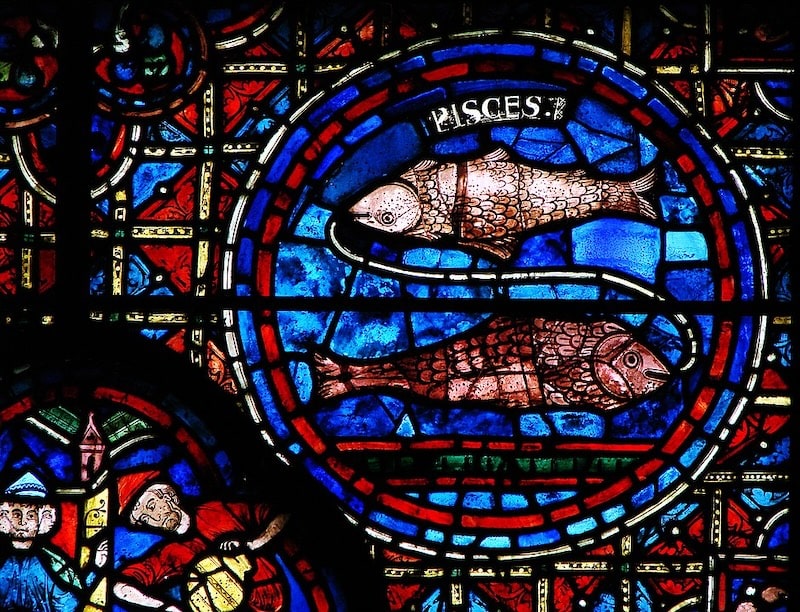Fascinated by Gallo-Roman history? Click Here to download > > > Here are 6 ways Rome affected France
- Home ›
- Ze French ›
- Holidays & Traditions ›
- April Fool's Day
How To Celebrate April Fool's Day In France
Published 30 March 2025 by Leyla Alyanak — Parisian by birth, Lyonnaise by adoption, historian by passion
As April first rolls around, a peculiar excitement fills the air in France. Mischievous children cut out paper fish, while adults brace for the inevitable pranks. This is "Poisson d'Avril," or April Fish Day, France's unique take on April Fools' Day.
I remember as a little girl being allowed to use blunt scissors to cut out fish shapes that I would then be permitted to stick on the backs of friends and family. To make them stick, we used that little adhesive tape trick − cut off a piece, then make a little circle to stick the two ends together.
No one was spared.
I took my fish to school, ready to pin my schoolfriends without mercy.
A few of the more daring students, usually boys, would occasionally go overboard − using something a little more permanent than tape, or heavens, colored fish! Some would even try their hand on a teacher or two...
No one escapes.
Once you find the fish on your own back, all you have to do is yell: "Poisson d'avril!"
In other words, April Fish.
Where did the fish come from?
Poisson d’avril means “April fish” — but why a fish, and why April?
There are several theories.
One popular explanation goes back to 1564, when King Charles IX reformed the calendar, moving the start of the year from late March to 1 January. Those who continued to celebrate the old New Year on 1 April became targets of ridicule, receiving mock gifts and invitations to nonexistent events.
In these early versions of the tradition, victims might be sent on fool’s errands or handed fake fish as a joke, giving rise to the name Poisson d’Avril.
This theory may be popular, but historians can’t agree.
Others point to the end of Lent, a period of fasting when meat was forbidden and fish often replaced it. Offering someone a fake fish could have been a tongue-in-cheek reference to this tradition.
The astrological sign Pisces, symbolized by two fish, ends around 20 March. Could this lingering imagery have influenced the use of fish in early April pranks?
 Pisces, one of the zodiac signs in stained glass at Chartres Cathedral
Pisces, one of the zodiac signs in stained glass at Chartres CathedralOr perhaps it stems from the start of fishing season in France. In April, fish are still young and easily caught — so calling someone a Poisson d’Avril may have meant they were as gullible as a fish caught too easily.
The phrase itself appears as early as the 15th century in French literature, including the satirical poem Le Livre de la Déablerie (1507), where poisson d’avril is used in a mocking tone.
Whatever the origin, the tradition stuck.
To this day, French children delight in cutting out paper fish and sneakily placing them on people’s backs, waiting for the moment of discovery.
Some famous examples of poissons d'avril
Over the years, France has witnessed some pretty outrageous pranks on April 1st, often orchestrated by the media. Here are a few of the most legendary ones:
- The Eiffel Tower is moving: In 1986, the newspaper Le Parisien claimed that the Eiffel Tower was being dismantled and moved to Marne-la-Vallée, where Disneyland Paris was being built. Parisians were outraged — until they realized the date.
- The lost village of Asterix: In 1993, a British newspaper reported the discovery of the real-life village of Asterix in Brittany. According to the hoax, researchers had found ancient coins featuring wild boars (Asterix’s favorite meal) and a collection of menhirs (standing stones like those carried by his sidekick, Obélix).
- Wind turbines and the earth's rotation: In 2009, France 2 news anchor David Pujadas reported that the increasing number of wind turbines around the world was slowing down the Earth’s rotation and would soon extend the length of a day by one hour. The prank was delivered with such seriousness that many viewers fell for it.
- Paris metro pranks: The Paris public transport authority loves renaming metro stations for April 1st. In one particularly clever prank, the station Opéra became “Apéro”, a nod to France’s beloved pre-dinner drinks ritual.
- Homer Simpson announces the trains: In 2009, the French railway company hired Philippe Peythieu, the official French voice of Homer Simpson, to make all train station announcements. Instead of serious train schedules, passengers were greeted with announcements like: “The train from Alaska is arriving on platform 12… Please watch out for bears.”
By and large, these pranks are harmless and usually witty, lightening up a normal day and egging us towards a good-natured laugh.
In France and want to play a prank on someone?
If you’re in France on April 1st, you might be tempted to join in the fun. And in case you're short on ideas, here are a few classic but harmless pranks that will make people smile without offense.
- 🐟 Paper fish on the back: This is the most traditional prank. If you do it well, it might take hours for someone to notice.
- 🔎 The invisible object trick: Point at the ground and tell someone, “Oh no, you dropped your phone!” and enjoy their moment of confusion.
- 🎭 Office shenanigans: Harmless office pranks are common in France, like covering a coworker’s computer screen with Post-it notes or flipping their keyboard layout to QWERTY if they’re used to AZERTY.
As I said... utterly benign and harmless!
Is April Fools’ Day a big deal in France?
While Poisson d’Avril is much loved, it’s not a public holiday in France, so no one gets the day off. But it is popular, especially among children, who take their fish-cutting mission very seriously. Schools even encourage the tradition, and teachers often play along.
For adults, the day is mostly about media hoaxes and workplace pranks. In some cities, particularly Paris and Lyon, you’ll see elaborate practical jokes in the media and online. In Nice, the traditional daily noon cannon blast is moved an hour earlier on April 1st as a playful prank on the locals.
The fish aren't only on your back — they're also in pâtisserie windows, because any excuse is a good excuse for chocolate!
So if you find yourself in France on April 1st, keep an eye on your back (so to speak). You never know when someone might try to turn you into a Poisson d’Avril! And remember, this is humor at its most understated, rooted in satire, not sales, designed to be lighthearted, creative and fun.
Did you enjoy this article? I'd love if you shared it!

